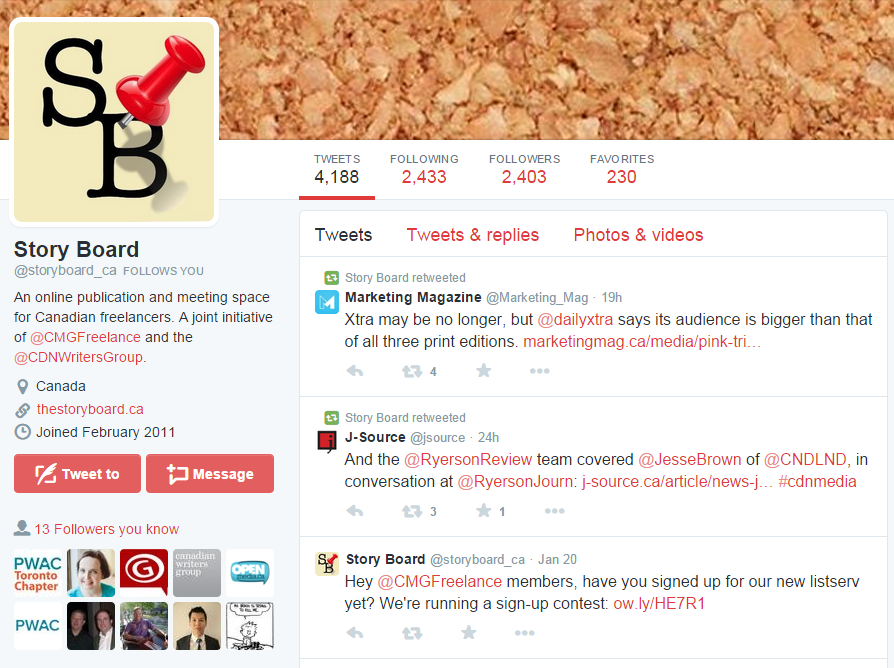Growing Your Freelance Writing Business: 4 Must-Haves for 2015
by Miranda Miller
Treating your writing business like a business means getting the supports and resources in place to help you to flourish. We write because we love to write; keeping the books and being our own PR people can be tedious and often falls to the wayside.
For several years, I struggled to expand my writing business. It was difficult to justify outsourcing any aspect of my business, or investing time in areas that didn’t bring an immediate payoff. I felt busy all the time – too busy. I wasn’t making enough money to justify this being a full-time job, yet I was putting in full-time hours and then some.
I was thinking about the business of writing all wrong.
In 2008, I had to get serious about my business. It was the year I became a single mother – writing wasn’t our second family income anymore and I had to make it work. Of course, there were growing pains and with each passing day, I became more acutely aware of just how much I still had to learn about business. A part-time job in a library supplemented my writing income, enabling my return to university full-time. A career writer studying for a Bachelor of Commerce may not make a lot of sense on its face, but those first-year business courses changed everything.
It’s probably not a lack of skill, motivation or opportunity preventing the growth of your writing business. Let’s explore four important areas of your business and how you can grow your business in 2015.
1. Administrative Support
You probably can’t afford to hire a full-time employee (or maybe you can, in which case you should go do that!). Outsourcing some of your administrative tasks can help make the management of your writing business more manageable and it may be more affordable than you think.
If there’s one business lesson I want you to grab and run with into 2015, it’s the microeconomic theory of opportunity cost, which is this:
“…the loss of potential gain from other alternatives when one alternative is chosen.”
Every business decision you make means forgoing another opportunity and the cost of that decision should make financial sense. Let’s see what may make sense for you.
Hire a Bookkeeper
I’ve taken bookkeeping and two levels of accounting, but despise actually doing it. My bookkeeping system pre-2009 consisted of a brief period of sheer panic to get invoices out at the end of each month, followed by a much longer interlude of my pretending there were no other bookkeeping tasks to do until tax time. April was a blur of spreadsheets, too much caffeine and sleepless nights each year.
I knew there had to be a better way, but didn’t think I could afford a bookkeeper – until I started thinking of the opportunity cost of not having one.
How much can you bill clients per hour? If you don’t charge by the hour but per project, determine your hourly rate by dividing your net monthly writing income (the amount you take home after paying expenses and taxes) by the number of hours you work on all facets of your business each month.
Now, can you hire a bookkeeper for less than you can bill or make per hour?
Say you earn $45 an hour writing, on average (I sure hope it’s a lot more than that, but we’ll go with $45). In Canada, you can probably get a bookkeeper for $25 an hour or less. The opportunity cost of not having one is the increased revenue you lose by spending time doing a $25 an hour job when you could be making $45 an hour – so you’re missing out on $20 an hour.
If the numbers don’t make a good case for hiring a bookkeeper, at least consider investing in Quickbooks or FreshBooks to help ease the pain.
Other Administrative Supports
Do you do a lot of interviews? Price out an outsourced transcriptionist. Outsourced administrative tasks might also include managing your contact database, online research, sorting and prioritizing email, seeking out potential clients and more.
Look locally if you prefer, or check out freelance marketplace websites like freelancer.ca, oDesk or Elance to find a remote assistant.
If you’re turning down work because your availability is too scant or you’re booking too far out, see if there are any hours in the week spent doing tasks that could just as easily be outsourced. How much is doing everything yourself costing you? You might be surprised.
2. Beefed-Up Social Media Presence
As a freelance writer, you are your own marketing department. If you aren’t yet comfortable with social media technology, spend some time getting to know the “Big 3” networks: Facebook, Twitter and LinkedIn.
Facebook is the largest social network on the planet and here at home in Canada, over 19 million people use the site each month. It’s a good place to stay connected with friends, but is also a great tool for marketing your writing business.
Create a page for your writing business. A page shows all of its content publicly by default, but people who choose to follow your page won’t have access to any of the information you post on your personal account. The flip side of that enhanced privacy is that you can’t see who likes the page unless they are also connected to your personal account, but you can see how many people read each of your posts and share your content.
Try to post regularly; one or two updates a week helps keep readers interested in your page. Post links to your published work, talk about events you’re attending, write about your writing process – you’re a writer! You’ll never run out of things to share with people who enjoy your work.
Twitter is an excellent social network for writers and journalists. Every day, over 500 million real-time tweets (messages of 140 characters or less) are sent out by Twitter’s 284 million global active users.
That sounds pretty overwhelming, doesn’t it? Fortunately, you can choose the accounts you’d like to follow. Tools like hashtags help you sort through tweets posted by all users, organized by topic. Mashable has a helpful beginner’s guide to hashtags to check out before you jump in with both feet.
Each Twitter user has a profile with a cover image, profile image, and short bio which can include links to their website or online portfolio. People who choose to follow your account will see your tweets in their own stream.
Where do your clients live online? That’s where you need to be in social media.
3. Professional Reviews and Recommendations
LinkedIn has proven the most powerful social network for the promotion of my writing business. Known as the professional social network, it offers writers the ability to promote their work, publish straight to the LinkedIn platform (which is a great way to syndicate your content published elsewhere), and more.
One of my favourite LinkedIn profile features is the Skills & Endorsements section. People who have connected with you on LinkedIn and accepted you into their network are encouraged to endorse you for specific skills.
Other users – say, a prospective client doing a background check on you – can see how many other professionals recommend you for these skills. Of course, endorsing the skills of others increases the likelihood your connections will endorse you, as well.
Recommendations are longer, written reviews of your work and professional capabilities. Once you’ve built out your LinkedIn profile and connected with people in your field, you can send messages through the network asking those you’ve worked with to write a recommendation for you.
There is a recommendations section on your profile, but they also appear in your experience section if the author indicated they worked with you in a specific project or company.
Spend a few hours going over your LinkedIn profile and adding as much information as possible. There’s now a portfolio section where you can upload files or even link to published works and have it pulled in to display on your profile. Show people what you’re all about and they will endorse your skills and recommend your work.
Google+ is another social network that doubles as a marketing tool. If you had joined Google+ over the last two years, you might have participated in their authorship program, which was an attempt at measuring topic expertise and authority across publications. Featured writers had expanded listings in search engine results, with their profile image (typically their headshot) prominently displayed on the largely text-only search results page. Well, that’s gone now – Google killed off authorship in 2014.
Is there any point then in investing in Google+ as a marketing channel for your freelance writing business?
If you’re seeking local gigs and clients, you absolutely should use Google+. The Google My Business program gives businesses of all sizes a free Google+ page, which in turn gives them a business a listing in Google Maps, Google+ and Search results.
You can connect your Google+ page to your website in the search results, as well, so people looking at your website listing will see your reviews right below your website listing.
4. A Strong, Relevant Referral Network
I’m constantly referring business people who contact me to other writers. Why don’t I keep all that business for myself?
Inevitably, you’re going to get inquiries that just aren’t a good fit. Having a solid network of contacts means never having to flat out tell someone no; you can refer them to another writer who may be a better fit for the project.
Both parties appreciate this and they won’t forget it. You’ve just saved someone the time and effort of finding another writer and your freelance contact has the opportunity to land a gig! You’ll be known among your contacts as that super helpful person who selflessly make recommendations and is always willing to help someone else out. People will send you flowers and chocolate – I’m not even kidding. I received a gorgeous Harry & David gourmet food basket a few months ago for connecting an author with several of my online marketing industry contacts for interviews.
Focusing on being helpful and building real connections is a far better way to network than the slimy, spammy tactics promoted by some “gurus.” Don’t blast messages of self-promotion out to your network. That gets old real fast.
 LinkedIn is a great place to make new connections and start expanding your referral network, as well. Join writing and freelancing industry groups and take a few minutes each day to participate in the professional conversations happening in those groups and in your stream.
LinkedIn is a great place to make new connections and start expanding your referral network, as well. Join writing and freelancing industry groups and take a few minutes each day to participate in the professional conversations happening in those groups and in your stream.
Smartphone apps like Happening can help you find upcoming events in your area where you can meet new people and expand your network. If you live in the middle of nowhere (like me) you’ll want to join relevant professional organizations that offer both in-person and virtual opportunities to connect with others – organizations like CMG Freelance.
There will also be networking opportunities, both on and offline, in your area of specialization. Of course, you’re going to get overwhelmed with all of these new contacts and need to get organized to make good use of your network. Try a service like ContactZilla to record and sort contact details and keep detailed notes on each of your contacts.
As the shift from traditional publishing to businesses-as-publishers continues, freelance writing opportunities abound for business-savvy writers on just about every topic. Magazine and newspaper jobs may be drying up, but brands are crying for top quality content authored by professional writers and former journalists. Treating your writing business like a business will help you stay competitive, compete in this new environment and grow in 2015!
Questions? Feel free to reach out to me on Twitter and I’ll do my best.
Miranda Miller is a business and marketing writer from Owen Sound, Ontario. You can find her on Twitter at @MirandaM_EComm.








on January 23, 2015 at 6:36 pm
· Permalink
Totally agree on outsourcing. With a limited number of hours to write, why spend time transcribing? I prefer doing my own finances until tax time comes around, but I do use professional software to manage everything in the meantime. Excellent advice!
on January 24, 2015 at 9:30 am
· Permalink
Thanks for reading and commenting, Lori! What software do you use to manage your finances? One of the options Miranda mentions, or something different?
on January 26, 2015 at 3:01 am
· Permalink
I absolutely love QuickBooks online. They have a great intro offer, the interface is easy to use, and it doesn’t matter what computer you’re on.
on January 26, 2015 at 8:27 pm
· Permalink
I’m also a huge fan of QuickBooks, Lori. Thanks for commenting!
on February 4, 2015 at 4:32 am
· Permalink
Thanks for keeping it straight forward and simple. Fits exactly to what i am looking for. Thanks very much!